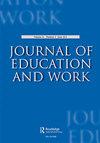出发前往新的海岸!中介在青年就业流动中的探索性分析
IF 1.7
Q2 EDUCATION & EDUCATIONAL RESEARCH
引用次数: 1
摘要
基于在卢森堡和挪威进行的一项欧洲内部青年流动研究的传记访谈,本文旨在促进关于如何理解和解释欧洲内部青年就业流动中机构复杂性的辩论。批判性地反思和操作埃米尔拜尔和米什在欧洲内部年轻人就业流动领域的代理取向的概念化,我们a)从关系的角度探索研究机构的有用性,我们b)详细说明年轻的流动如何反映他们在感知的偶然时刻下的操作,我们c)增强我们对习惯的复杂交织的了解,对(偶然的)就业流动情境和年轻人具体就业流动实践的想象和判断。我们的研究结果强调了考虑不同的代理取向如何与偶然的就业流动背景交织在一起的重要性,这些背景包括激进的自我实现、自我实现和情境约束的适应性相互作用,以及受情境约束强烈约束的代理取向。此外,实证分析表明,埃米尔拜尔和米什方法的一些理论命题需要重新审视。本文章由计算机程序翻译,如有差异,请以英文原文为准。
Setting out for new shores! An explorative analysis of agency in youth employment mobility
ABSTRACT Based on biographical interviews from an intra-European youth mobility study in Luxembourg and Norway the article aims to contribute to the debate on how to understand and account for complexities of agency in youth intra-European employment mobility. Critically reflecting and operationalising Emirbayer and Misches’s conceptualisation of agentic orientations in the field of intra-European employment mobility of young people, we a) explore the usefulness of researching agency from a relational perspective, we b) elaborate on how young mobile reflect their manoeuvring under perceived contingent moments and we c) augment our ken of the complex interlacement of habit, imagination and judgement with (contingent) employment mobility contexts and young people’s concrete employment mobility practices. Our results emphasise the importance of considering how differently agentic orientations interlace with contingent employment mobility contexts ranging from radical self-realisation, adaptive interplay of self-realisation and situational constraints and agentic orientations strongly bounded by situational constraints. In addition, the empirical analysis shows that some of the theoretical propositions of Emirbayer and Mische’s approach have to be revisited.
求助全文
通过发布文献求助,成功后即可免费获取论文全文。
去求助
来源期刊

Journal of Education and Work
EDUCATION & EDUCATIONAL RESEARCH-
CiteScore
2.70
自引率
14.30%
发文量
40
期刊介绍:
The Journal of Education and Work is an international forum for academic research and policy analysis which focuses on the interplay of the education and economic systems. The journal examines how knowledge, skills, values and attitudes both about and for work and employment are developed within the education system. The journal also explores the various forms of industrial training and accreditation in the economic system, including changes in the economic and industrial infrastructure which influence the type of employees required. Work in the informal economy is also included.
 求助内容:
求助内容: 应助结果提醒方式:
应助结果提醒方式:


